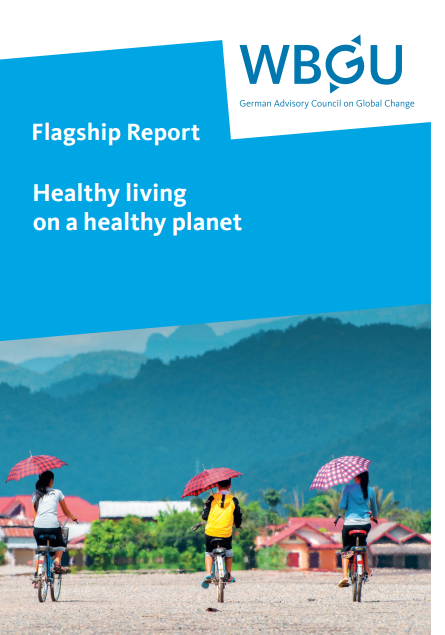Underscores the connection between human health and the environment. It zeroes in on three key areas: diet, mobility, and habitat. The report points out that our lifestyle adversely impacts our health and the natural ecosystems. It recommends adopting environmentally friendly lifestyles, enhancing health systems, and encouraging societal change to foster a healthy life on a healthy planet. It asserts that this vision can be achieved solely through international collaboration and an immediate global governance approach. Healthy living on a healthy planet
Overview
Introduction
Outlines the relationship between human and planetary health, emphasizing the importance of sustainable living for the well-being of both current and future generations. It highlights the impact of climate change, pollution, and biodiversity loss on human health. The concept of One Health is introduced, recognizing the interconnection of human, animal, and environmental health. This introduction sets the stage for the entire document, underscoring the need for collective efforts to promote a healthy lifestyle on a healthy planet.
Health – a systemic view
The intricate relationship between human health and the environment is closely examined, detailing how various stressors such as air pollution, water contamination, and climate change can critically impact health. For instance, air pollutants can lead to respiratory and cardiovascular complications and even neurological effects. Likewise, water contamination can result in diseases and ongoing health issues.
It emphasizes the necessity for a comprehensive, systemic strategy to address health difficulties. This considers individual behaviors and broader health determinants, allowing for more robust, sustainable interventions. Intriguingly, this approach aligns with the One Health principles, which recognize the connection between human, animal, and ecosystem health and the importance of interdisciplinary collaboration.
Finally, the concept of planetary health, which centers on human well-being and environmental sustainability, underscores the interaction between human health and the planet’s health. It advocates for sustainable practices and policies that benefit the environment and people, striving for a balance that fosters global health.
The vision of healthy living on a healthy planet
Outlines a compelling vision for a sustainable and equitable future where human health and environmental well-being are intertwined. It articulates a holistic approach that considers the complex interactions between individuals, communities, and the planet, emphasizing the need for collective action to address pressing global challenges. Envisions a world where health promotion strategies are integrated with environmental conservation efforts, recognizing the intrinsic link between a healthy population and a healthy planet.
It advocates for policies and practices prioritizing sustainability, social justice, and resilience, aiming to create environments supporting healthy lifestyles and protecting natural ecosystems. Furthermore, the vision emphasizes fostering partnerships across sectors and disciplines to drive positive change. By engaging stakeholders from government, academia, civil society, and the private sector, the vision seeks to catalyze innovative solutions that promote planetary health and advance the well-being of all individuals.
Shaping areas of life: what we eat, how we move, where we live
Delves into the critical aspects of daily life that significantly impact individual health and environmental sustainability. Specifically, it explores the interconnected relationships between diet, physical activity, and living environments, thereby highlighting the importance of making conscious choices to promote well-being and planetary health.
Regarding diet, it emphasizes the significant role of food choices in shaping health outcomes and environmental impact. It discusses the importance of sustainable and nutritious diets that support individual health and reduce the ecological footprint of food production and consumption. For example, individuals can contribute to personal health and environmental sustainability by promoting plant-based diets, reducing food waste, and supporting local and organic food systems.
Highlights physical activity’s importance in health promotion and reducing non-communicable diseases. It recommends integrating physical activity into daily life, like walking or cycling for transport, recreational activities, and fostering environments for active living. Consequently, individuals can improve health and reduce carbon emissions and air pollution by prioritizing active transportation, green spaces, and walkable communities.
Underscores the importance of sustainable urban planning and design in creating healthy and resilient communities. It discusses the benefits of compact, mixed-use developments promoting active transportation, green space access, and social connectivity. Therefore, by designing cities and neighbourhoods prioritizing public health, environmental quality, and social equity, policymakers and urban planners can create environments that support the well-being and sustainability of all residents.
Managing planetary risks: climate change, biodiversity loss, pollution
Addresses the urgent need to confront key environmental challenges that pose significant risks to human health and the planet’s well-being. Specifically, it focuses on the interconnected climate change, biodiversity loss, and pollution issues. It highlights the critical importance of taking proactive measures to mitigate these risks and safeguard the health of current and future generations.
Firstly, climate change is identified as a pressing global threat with far-reaching implications for human health, ecosystems, and socio-economic systems. It emphasizes the need for ambitious climate action to reduce greenhouse gas emissions, transition to renewable energy sources, and build resilience to the impacts of a changing climate. By addressing climate change, societies can mitigate health risks associated with extreme weather events and infectious diseases. Moreover, it opens up opportunities for sustainable development and improved well-being.
Secondly, biodiversity loss is another significant challenge discussed in the section. This has implications for ecosystem services, food security, and human health. It underscores the importance of preserving biodiversity through conservation efforts, sustainable land use practices, and ecosystem restoration. Consequently, by protecting biodiversity and promoting ecosystem health, societies can enhance resilience to environmental changes, support sustainable food systems, and safeguard the natural resources that underpin human health and well-being.
Lastly, pollution is identified as a pervasive threat to human health and the environment, with detrimental effects on air quality, water resources, and ecosystems. It highlights the need for comprehensive pollution control measures, including regulations, technological innovations, and public awareness campaigns. By reducing pollution levels and promoting clean technologies, societies can improve air and water quality, reduce the disease burden, and create healthier living environments for all individuals.
Harnessing the transformative potential of health systems
Explores the role of health systems in promoting both individual well-being and planetary health. It delves into the transformative potential of health systems to address complex health challenges, advance sustainability goals, and contribute to a healthier and more equitable society.
It emphasizes the need for health systems to adopt a holistic approach that integrates health promotion, disease prevention, and environmental sustainability. Advocates a shift towards patient-centred care models prioritizing prevention, early intervention, and health promotion strategies. Health systems can play a key role in improving population health outcomes and reducing health inequities by promoting healthy lifestyles, addressing social determinants of health, and reducing environmental risks.
Furthermore, the section highlights the importance of building resilient health systems that effectively respond to emerging health threats, including climate change, biodiversity loss, and pollution. It discusses the need for health systems to enhance their capacity for surveillance, preparedness, and response to environmental health risks. By integrating environmental health considerations into healthcare delivery, health systems can better protect populations from environmental hazards and build adaptive capacity to address future challenges.
Moreover, it underscores the potential for health systems to lead by example in promoting sustainability and reducing their environmental footprint. It discusses the importance of green healthcare practices, such as energy efficiency measures, waste reduction strategies, and sustainable procurement policies. Health systems can reduce carbon emissions, conserve resources, and promote environmental stewardship by implementing environmentally friendly practices within healthcare facilities.
Global urgency governance
Addresses the need for effective governance structures and international cooperation to tackle global health and environmental challenges. Emphasizing the urgency, it calls for collective action to address pressing issues such as climate change, biodiversity loss, pollution, and other planetary risks that threaten human health and well-being.
Highlights the need for global cooperation and governance to tackle issues beyond national borders. As a recommendation, it calls for enhanced global partnerships and knowledge exchange to boost sustainable development, public health, and environmental protection. In this context, global governance, involving governments, civil society, academia, and the private sector, can aid in applying evidence-based solutions to global challenges.
Significantly, the section underscores the role of international organizations like the United Nations and the World Health Organization in coordinating planetary health initiatives. It stresses the need for improved global governance, introducing novel funding methods, and enhancing accountability to fulfil sustainable development goals and other international commitments. Accordingly, countries can leverage these organizations’ expertise and resources to tackle mutual challenges for a healthier, more sustainable future.
Lastly, it accentuates the need for inclusive governance involving diverse stakeholders, including marginalized and indigenous communities. It promotes a rights-based approach, focusing on equity, social justice, and human rights in health, environment, and sustainable development decisions. Therefore, by fostering active participation, global urgency governance can enhance transparency, accountability, and inclusivity in tackling planetary health challenges.
Education and Science
Stresses the crucial role of education and scientific research in promoting planetary health, sustainable development, and well-being for all. It emphasizes the importance of investing in education, fostering scientific literacy, and advancing research to address our society’s complex environmental and health challenges.
Firstly, it highlights the importance of incorporating sustainability, environmental awareness, and health promotion at all levels of education. It advocates for a multidisciplinary approach that equips students to understand the link between human health, ecosystems, and the environment. In this context, it emphasizes that, through environmental education and sustainable practices, individuals can make informed decisions and contribute significantly to a sustainable society.
Secondly, it stresses the significance of research in formulating evidence-based solutions for planetary health issues, including climate change, biodiversity loss, and pollution. It pushes for fostering interdisciplinary research, data sharing, and innovation to comprehend complex environmental systems and their impact on human health. As a result, societies can strategize effective mitigation measures, protect ecosystems, and endorse sustainable development through investment in research.
Finally, it underscores the importance of clear science communication in bridging the gap between research and policy-making. It promotes transparency and inclusivity in conveying scientific results to decision-makers and the public to inform choices, heighten awareness, and encourage positive change. Hence, education and science can foster evidence-based decisions and science-informed policies for a sustainable, equitable, and healthy future.




